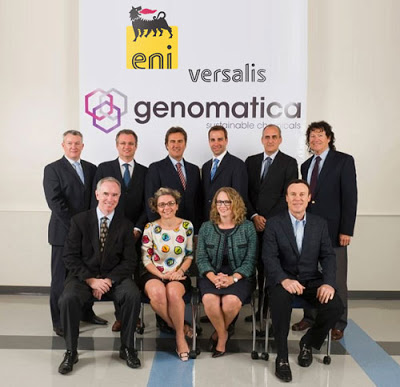As the blog mentioned yesterday, development for bio-butadiene seems to be expanding as evident with the entry of Cobalt Technologies and its two Asia-based partners announced this week.
Last week, similar to what Cobalt Technologies is planning, Versalis and Genomatica formalized its technology joint venture agreement to develop a complete end-to-end process for on-purpose production of butadiene from non-food biomass as well as start licensing this technology across Europe, Asia and Africa.
Future licensees of the process, including Versalis, will provide the capital required for the construction and operation of their own plants. The JV will also be responsible for use and sale of the resulting bio-butadiene.
Versalis aims to be the first to license the process and build commercial plants. Versalis will provide over $20m in funding to Genomatica to support the end-to-end process. According to Versalis, Genomatica’s technology, among other fermentation-based technologies, is the best one positioned to satisfy market needs for butadiene.
Just like the bio-succinic acid race, the ultimate showdown here is who can produce the most economical bio-butadiene.
The long-term supply outlook for global butadiene is for the market to be tight as the forecast for butadiene demand is to outstrip supply because of the expected under-utilization of European crackers due to new Middle East capacities; the preference to crack lighter, more competitive feeds in the Middle East and the US (influenced by shale gas); and not enough dedicated butadiene facilities to cope with future growth in demand especially from BRIC countries.
On top of these factors, pricing for natural rubber has always been historically volatile which can sometimes drive butadiene (and other synthetic rubber feedstock prices) even higher. The biggest market application for butadiene is in the manufacture of synthetic rubbers. Given that Versalis is a major producer of elastomers, Versalis also wanted to optimize its feedstock supply chain not only with bio-based butadiene but also with a natural rubber called guayule through its recent partnership with guayule rubber producer Yulex.
Early this month, Versalis has partnered with tire manufacturer Pirelli to develop the use of guayule in tire production. Pirelli will carry out trial tests under the three-year research project to validate the performance of the natural rubber for tire production.
As soon as new industrial quantities become available, Versalis will supply Pirelli with guayule from Yulex to complement the current set of synthetic rubber materials that Versalis is already supplying to Pirelli for the production of conventional tires.
Interestingly enough, Pirelli said it has already produced tires using renewable materials such as rice husk. The tire industry is really stepping up its game when it comes to using bio-based materials for tire manufacture.
The blog recalls Cooper Tire & Rubber Company also developing guayule polymers and resins for tire applications with Yulex; Bridgestone also has its own guayule project with a pilot farm in Arizona, as well as the use of Russian dandelion as possible source of tire-grade rubber. Bridgestone also has a partnership with Ajinomoto on biomass-based isoprene — another feedstock to make synthetic rubber. Michelin is working with Amyris for the development of farnesene-based isoprene, and Goodyear working with Dupont also on bio-based isoprene.
Back to Versalis, the company has another joint venture called Matrica with Novamont, which aims to build a biorefinery at Versalis’ Porto Torres, Sardinia, site in Italy. The biorefinery is expected to produce bio-based monomers, bio-lubricants, bio-fillers and bioplastics. No specific timelines have yet been announced for the construction and start-up of the biorefinery.
FOLLOW ME ON THESE SPACE
Eni supply butadienne to pirelli. Thanks for all posts.
Posted by pwak | April 22, 2013, 4:04 am